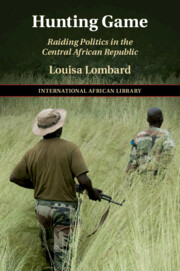Book contents
- Hunting Game
- The International African Library
- Hunting Game
- Copyright page
- Contents
- Figures
- Maps
- Acknowledgements
- Abbreviations and acronyms
- Map
- 1 Force, status, and uncertainty in the arts of acquisition
- 2 Zariba contests and collaborations
- 3 Manhunts persist in an unfortunate colony
- 4 Big-game hunting and regulatory sociality
- 5 The limits of law in coercive conservation
- 6 Camouflage skills
- 7 Denunciation and liberty
- 8 Force and status in rebellion
- 9 Sovereignty and distribution amid forceful acquisition
- References
- Index
- Titles in the series
4 - Big-game hunting and regulatory sociality
Published online by Cambridge University Press: 20 April 2020
- Hunting Game
- The International African Library
- Hunting Game
- Copyright page
- Contents
- Figures
- Maps
- Acknowledgements
- Abbreviations and acronyms
- Map
- 1 Force, status, and uncertainty in the arts of acquisition
- 2 Zariba contests and collaborations
- 3 Manhunts persist in an unfortunate colony
- 4 Big-game hunting and regulatory sociality
- 5 The limits of law in coercive conservation
- 6 Camouflage skills
- 7 Denunciation and liberty
- 8 Force and status in rebellion
- 9 Sovereignty and distribution amid forceful acquisition
- References
- Index
- Titles in the series
Summary
Manhunts for forced labour led to thousands of deaths. Foreign diseases and slave raiding also dramatically reduced the number of humans living in the area. With so few people, the prevalence of big game was all the more striking. By the 1930s, large expanses of the north-east were consecrated hunting reserves, and safari hunting became the official development plan for this area. But passing hunting regulations and dispatching people to implement them required the would-be enforcers to become raiders themselves, tracking and taking from people whose status was precarious but who could also prove dangerous, or otherwise well resourced. Hunting regulations written in faraway capitals were neither irrelevant nor a blueprint for ethical (licit) behaviour. They were, instead, a kind of bare-bones scaffolding added to the landscape, a structure that could be climbed and otherwise manipulated to afford new opportunities for camouflage and for taking. Violence, particularly in the form of forceful acquisition amid status uncertainty, has been an important part of repertoires of meaningful action in the hunting zone, but clear determinations regarding its morality are most easily made at a remove, spatial or temporal, from the encounters themselves. This is because the encounters are marked by entrainment, which diminishes the importance of deontological principle to the conduct of action. Regulation and avoidance, rather than being based on rules and principles, are based on more proximate, interactional moves, in which there are possibilities for both identification with another and violence.
- Type
- Chapter
- Information
- Hunting GameRaiding Politics in the Central African Republic, pp. 88 - 114Publisher: Cambridge University PressPrint publication year: 2020

